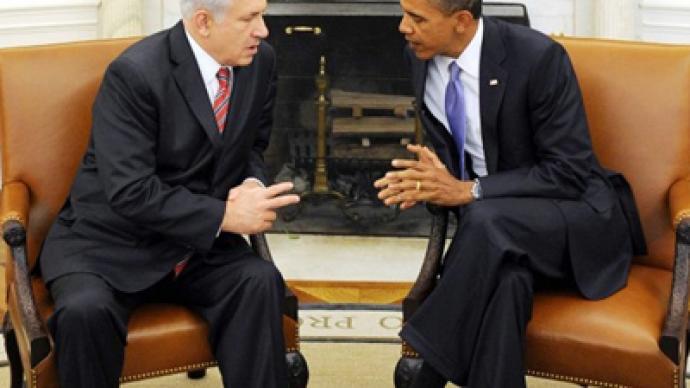Netanyahu brings old map to White House

Israeli PM Benjamin Netanyahu, meeting US President Obama in Washington on Friday, rejected Obama’s proposition that Israel revert to its 1967 boundaries as this would make the country “indefensible.”
President Obama agreed that at that moment the two leaders had different views on the region’s future, but said that it was a disagreement "between friends.”Netanyahu told Obama that Israel values the US President's efforts to advance the peace process in the region. “Israel wants peace, I want peace,” said the Prime Minister as cited by the Associated Press. But he underlined that while Israel could make some concessions in the peace talks, the 1967 boundaries were "indefensible."Netanyahu also repeated that Palestinian leaders would have to choose between a reconciliation agreement with Hamas, which Tel-Aviv considers to be a terror group, or peace with Israel.The Israeli Prime Minister arrived in Washington on Thursday, hours before Obama delivered his speech on the Arab world at the US State Department. Talking of the Israel-Palestine negotiations, which deteriorated in September 2010 over the construction of new Israeli settlements on the disputed territories, Obama said that “the dream of a Jewish democratic state cannot be fulfilled with permanent occupation.” The US President then called on the borders of Israel and Palestine to be based along 1967 lines “with mutually agreed swaps, so that secure and recognized borders are established for both states.”Reverting to 1967 borders would mean Israel giving up the West Bank, East Jerusalem and Gaza Strip.Israel's Prime Minister Benjamin Netanyahu has sharply disagreed with Obama, saying that a Palestinian state configured that way would leave Israel "indefensible" and urging Washington to reconfirm its commitments to the decision by Congress and President Bush of 2004 that Israel would not have to give up the occupied territories.
Obama was the first US President to openly support the idea of going back to 1967 borders as being key to the peace process in the Middle East. Nevertheless, Obama let the audience understand that the role of the US in this conflict is purely one of an adviser.The record of US-Israeli relations has become complicated. In February this year, the US vetoed a UNSC resolution condemning continued Israeli settlements expansion as illegal in a vote of 14 pros and only one – the US – con. This happened shortly after US Secretary of State Hillary Clinton explicitly called those settlements “illegitimate” in her interview with the American ABC Channel. Stephen Zunes, professor of politics at the University of San Francisco, told RT that President Obama’s willingness to press Israel to give its side of the bargain would make relations between the US and Israel trickier.“I talked about mutually-agreed upon swaps of land, which implied that the US is open to having Israel annex some settlement blocks near the old border in return for an equivalent amount of the Israeli land. And while President Obama and the Palestinian authorities have expressed their willingness to accept these kinds of swaps, Netanyahu has totally opposed that kind of thing. But the question is, will the US be willing to pressure Israel, including threatening with withholding of aid, in order for Netanyahu to live up to its side of the needed compromise? So far I’ve seen no indication of President Obama [being] willing to do that,” said Zunes.
The US cannot play a neutral role in the Israeli-Palestinian conflict, thinks Conn Hallinan, a contributing editor for Foreign Policy in Focus. “The USA gives Israel about $3 billion a year in aid, which goes to military stuff, and a lot of this money flees to Israeli settlements in the occupied territories. If this subject comes up in September, the General Assembly of the UN will overwhelmingly endorse the existence of the Palestinian state based on the 1967 borders,” says Hallinan. “That is not a subject that can be vetoed in the Security Council, because it is a matter for the General Assembly. That will isolate the USA and Israel – and essentially they will stand alone in the world. I think neither one of them wants that. So there is a possibility you can begin to leverage some of these in the direction of negotiations, but I do not have too much faith in Netanyahu as a Prime Minister,” Hallinan added.
Phyllis Bennis, Director of the New Internationalism Project at the Institute for Policy Studies, points out that this is not the first time that a president has ever talked about the 1967 borders, as Israeli officials made it look after Obama’s speech on Thursday.“One year after the famous letter exchange between Bush and Sharon there was another letter, another statement from President Bush where he used the term ‘the 1949 Armistice Line’. That line is the 1967 border, though it is not the same word. There is nothing new. In fact, this speech was very much in keeping with the Israeli position that the Palestinian state will have to give up the land of the settlements, in return they will probably get some desert land bordering Gaza,” said Phyllis Bennis.“President Obama went further than that and said the Palestinian state will be the homeland of all the Palestinian people, implying that the right of return, which includes the right to return to homes inside what is now Israel, will not apply. Any Palestinians returning, Palestinian refugees, will have to go to the new Palestinian state, which was not, of course, their home,” Phyllis Bennis added.














